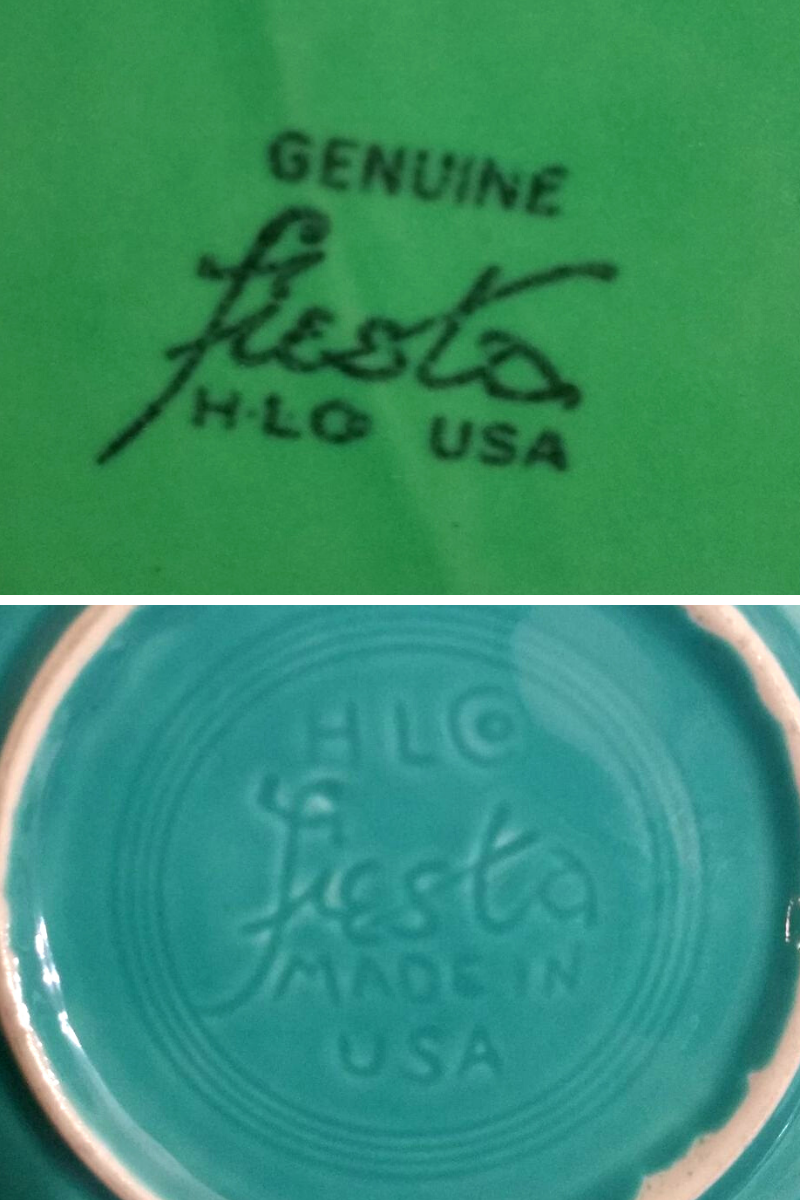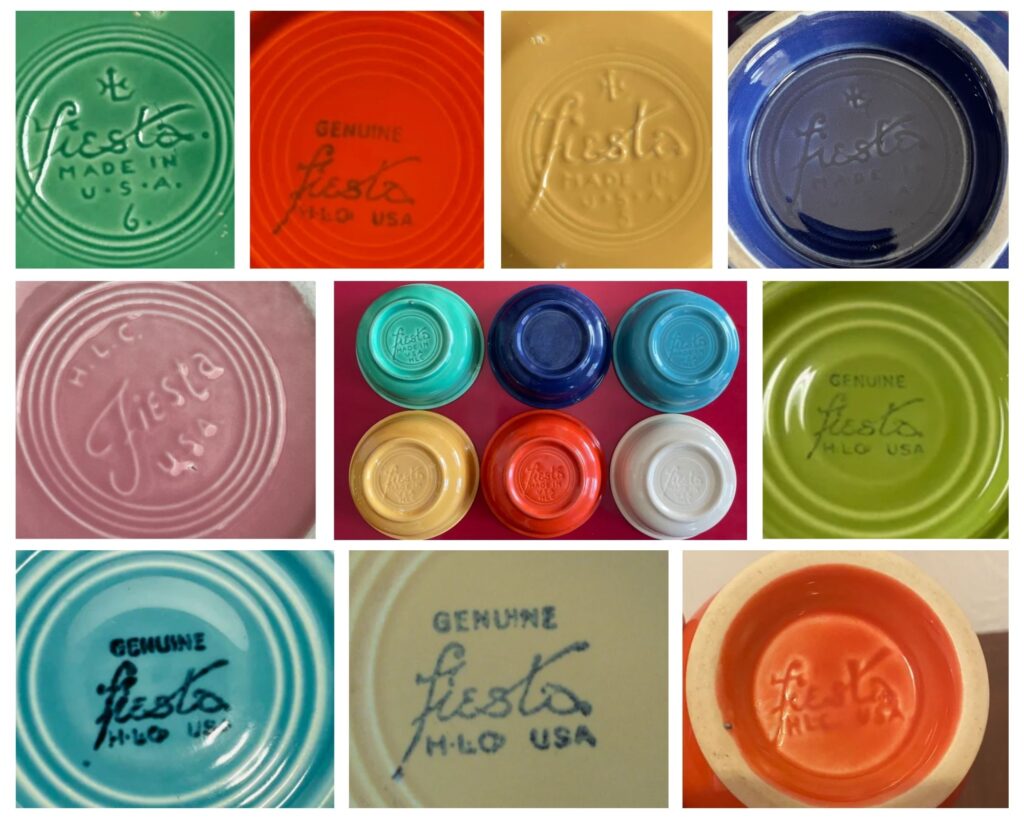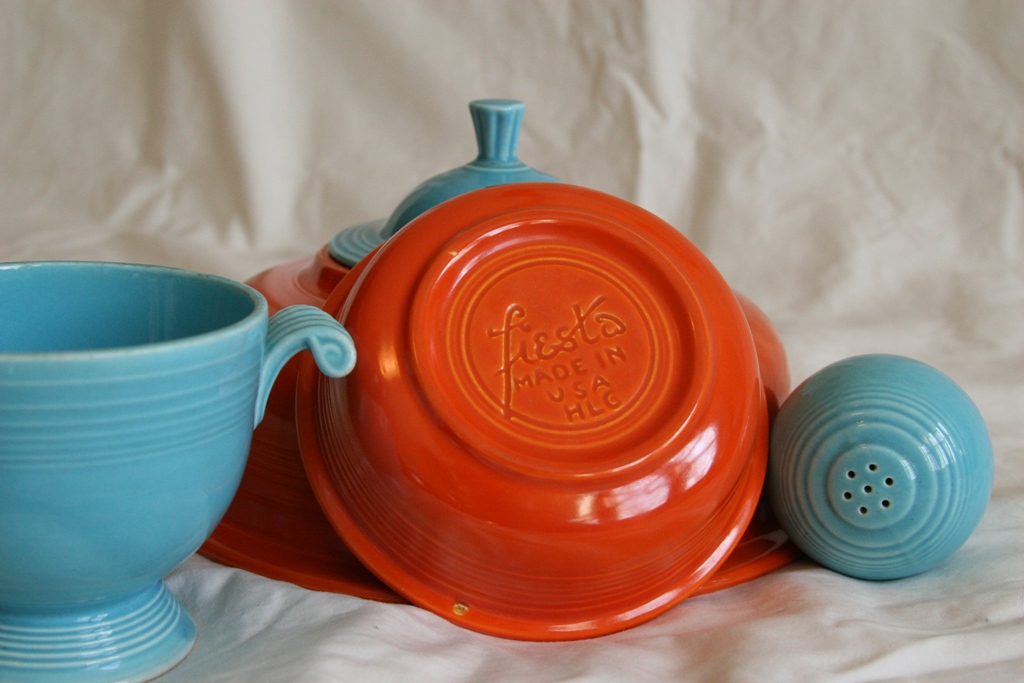Fiesta Markings Dating Your Vintage Fiestaware Fiestaware, Vintage

Vintage Fiestaware Markings Job Porn
Please note that turquoise, yellow, cobalt blue, and rose Fiestaware pieces have been produced again since 1986, so look at the markings on the bottom to determine if your Fiesta is the original vintage run of those colors from the 1930s-1970s, or if it's a modern post-1986 production.

Fiesta Markings Fiestas, Fiestaware, Being used
To assist you in identifying and dating old Fiestaware pieces, below is a simplified Fiestaware vintage markings chart: 1936-1943 (Original Red) & 1959-1972 (Original Blue). "HLC" (Homer Laughlin China) in a circle, typically with "Fiesta" or "Fiesta Kitchen Kraft.". Original Cobalt Blue, Light Green, 1936-1951.

Fiesta® Dinnerware Backstamps, Backstamps Dinnerware Fiesta,Fiesta
Markings: The vintage items will have an inkstamp on the bottom that says GENUINE fiesta, with Fiesta all lowercase. Look for a mold marking, too. It might say something like Fiesta HLC USA or HLC Fiesta Made in USA. (Lots of variety!) Glaze: The bottom of an old dish will be completely glazed, while a new Fiesta piece will show some un-colored.

fiesta_markings Fiesta, Fiestaware, Fiestas
Definitive Logo Marks of Old Fiestaware. Lowercase "fiesta" stamp: If the mark is an under-glaze stamp and the word "Fiesta" is entirely lowercase letters, the piece is vintage. " There are lots of variants in the markings, but older vintage Fiesta was ink stamped on the bottom in all lower-case letters," says Wilkes.

How Old is my Fiestaware? Fiesta Identification Guide Antique Answers
Recognizing Fiestaware Markings by Year. You may be able to determine whether Fiestaware dishes are vintage by examining the markings on the bottom of the piece. Collectors of Fiestaware consider items made between 1936 and 1972 to be vintage. If the mark on the Fiestaware has the word "fiesta" in lowercase letters, it is likely vintage.

Fiesta Markings Dating Your Vintage Fiestaware Fiestaware, Vintage
Love Fiesta Dinnerware? Check out our Fiestaware vintage color comparisons, combinations, see all Fiestaware bowls and their sizes, and learn how to spot the authentic Fiesta markings. Everything Kitchens has the latest Fiestaware colors and dinnerware by the piece!

All You Need to Know About Fiestaware The Colors and the Backstamps
Fiesta Made since 1986 Since 1986, Homer Laughlin has also used a rubber backstamp to mark some of its Fiesta items. Used mainly on cups and bowls, it uses the words HLC USA and genuine. Vintage Fiesta backstamps use a lower case "f" in the word Fiesta. The new stamp capitalizes the "F" in the name. All the backstamps are applied by machine.

How Old is my Fiestaware? Fiesta Identification Guide Antique Answers
Very important. Fiesta backstamps are the ink markings that appear on the bottom of the plate. These Fiesta markings all feature the word "Fiesta" in some form as well as some marking identifying Homer Laughlin as the manufacturer. With Fiesta backstamps that are in INK ONLY, you can identify and old piece of Fiestaware by the case of the.

Homwe Laughlin Fiesta
See all colors of Fiesta Dinnerware: https://evkitch.com/2MrR5UYIs your Fiestaware genuine? In this video, we'll check out differing back-stamps and also see.

How Old is my Fiestaware? Fiesta Identification Guide Antique Answers
This year marks the 133rd anniversary of the event. The 2024 theme is "Fiesta for All." One big change for this year — Fiesta's kick-off event, Fiesta Fiesta, will take place at a new.
DISHing with HLCCA Vintage vs. Contemporary Fiesta® Plates, Platters
The original colors (red, cobalt blue, light green, yellow, and ivory) are the most sought after but all colors of Fiestaware are popular. Medium Green, made from 1959-1969, is the rarest and most hunted color. A piece of Fiesta in that shade is very difficult to find. The original red color, made from 1936-1943, is also incredibly rare.

How To Tell Vintage Fiestaware From New Vintage Render
The color of the dinnerware is an indicator used to date Fiesta pieces since certain hues were produced for very limited periods. These early colors are usually broken down into the original colors of cobalt blue, light green, ivory, red, yellow, and turquoise (added to the line in 1937). Then there are the 1950s colors of chartreuse, forest.

About that vintage Fiesta butter dish…(Updated to include suspected
Fiestaware Backstamps As you can see from the color list, there are many colors that are long running or reintroduced throughout the years. If you pick up an current ivory piece of the backstamp. The Fiestaware backstamp appears on most Fiesta pieces and has evolved throughout the years.. But the above markings are the easiest clues to spot.

Fiesta® Dinnerware Colors 1936 1972 Fiesta colors, Fiestaware
Vintage Fiestaware markings will always have "fiesta" in lowercase letters. However, there are a few modern post-1986 pieces that also have the lowercase "fiesta" imprinted in-mold markings. The lowercase "fiesta" marking in and of itself does not necessarily mean that you have a vintage piece, UNLESS it is an ink-stamped marking.

wm
In addition to the piece being completely covered, you'll see three pin marks - these small indentations are a result of the glazing process. New Fiestaware will have a dry foot ring. Flip over your find! Sizing is another good way to tell vintage from modern apart. New plates are solid dimensions, like 15" or 6".

The Complete Guide to Fiesta Ceramics Estate Sale Blog
Identifying Fiesta Markings by Year. You may be able to tell if Fiestaware dishes are vintage by looking at the markings on the bottom of the china piece. Fiestaware collectors consider pieces made between 1936 and 1972 as vintage. If the label on the Fiestaware has the word "fiesta" in lowercase letters, it is probably vintage.